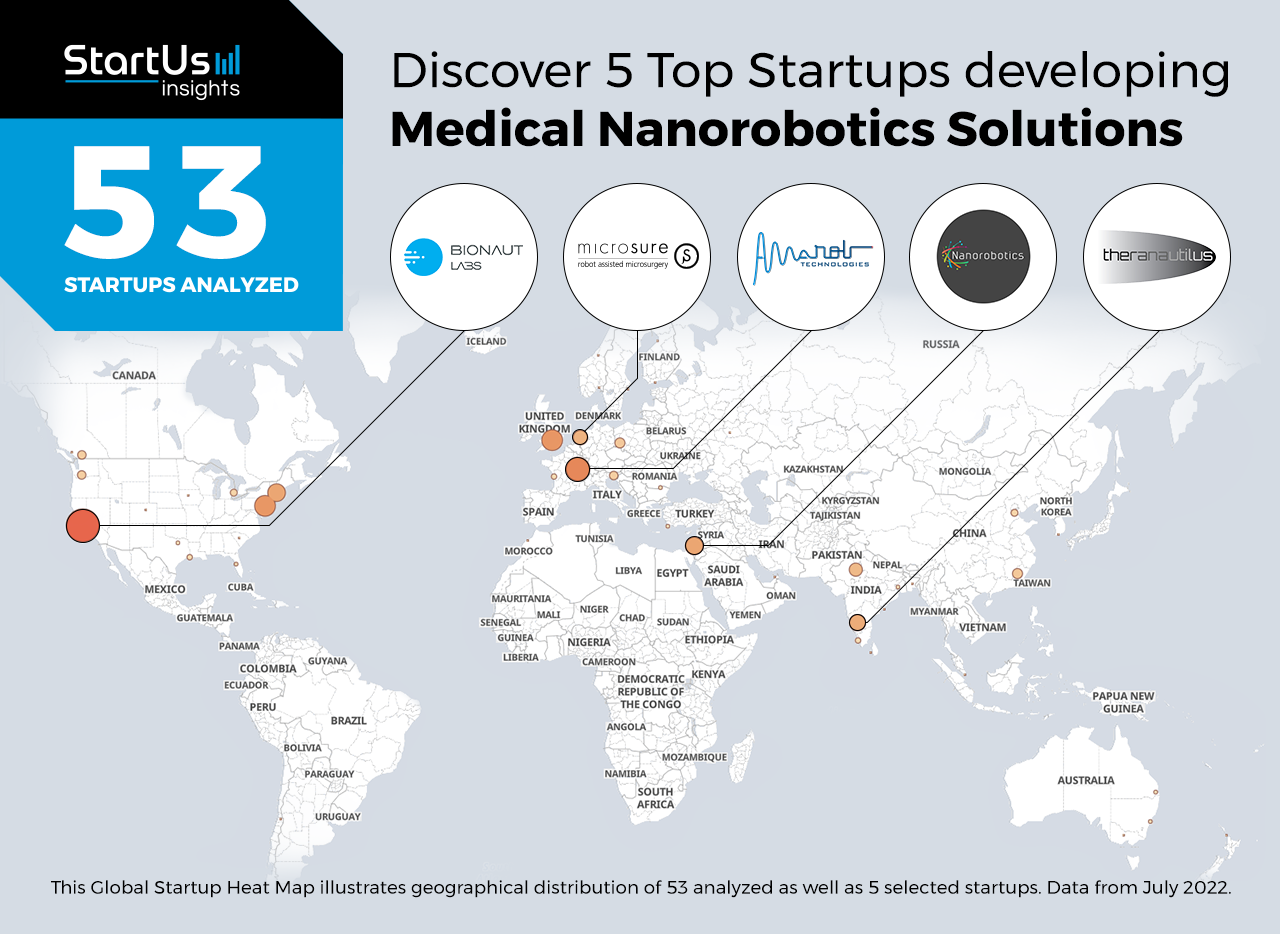Out of 53, the Global Startup Heat Map highlights 5 Top Medical Nanorobotics Startups
Startups such as the examples highlighted in this report focus on high-precision surgeries, tremor filtering, non-invasive drug delivery, and microsurgery. While all of these technologies play a significant role in advancing healthcare, they only represent the tip of the iceberg. This time, you get to discover five hand-picked medical nanorobotics startups.
The Global Startup Heat Map below reveals the geographical distribution of 53 exemplary startups & scaleups we analyzed for this research. Further, it highlights five healthcare startups that we hand-picked based on scouting criteria such as founding year, location, funding raised, and more. You get to explore the solutions of these five startups & scaleups in this report. For insights on the other 48 medical nanorobotics startups, get in touch with us.
Bionautlabs develops Remote-Controlled Micro-Robots
Founding Year: 2016
Location: Los Angeles, US
Funding: USD 20 M
Reach out to Bionautlabs for Small Molecule Therapies
US-based startup Bionautlabs builds Bionauts, remote-controlled micro-robots to treat central nervous system disorders. They target deep brain structures safely and precisely to deliver biologics or small molecule therapies. Bionauts traverse the densest tissue in a non-invasive to minimally invasive manner. Besides, Bionautlab’s imaging technology and precision controls allow medical operators to guide the robots with optimal speed, motion, and routes. Thus, these robots enable therapeutic treatments for diseases such as Parkinson’s, Huntington’s, and Hydrocephalus stroke.
Nanorobotics makes Cancer Cell-killing Nanomachines
Founding Year: 2019
Location: Hod HaSharon, Israel
Partner with Nanorobotics for Malignant Tumor Specificity
Israeli startup Nanorobotics develops proprietary robotic technology that targets and kills cancer cells. Its molecular nanomachines are tiny (1 nm) synthetic molecular motors that alter the conformation of the cancer cells in response to external light stimuli. The nanorobots perforate cellular membranes by targeting specific cell surface elements through their association with the lipid bilayer. This active targeting of distinct cell types through specific cell-surface recognition elements and ligand-receptor systems enables tumor specificity. The cell-killing nanomachines treat non-muscle invasive bladder cancer, glioblastoma multiform, and squamous and basal cell carcinoma.
AMAROB Technologies advances Microbot Surgical Devices
Founding Year: 2020
Location: Besancon, France
Work with AMAROB Technologies for Laser Surgeries
French startup AMAROB Technologies manufactures microbot surgical devices to perform intracorporeal laser surgeries. Its robotic system uses a miniature laser scalpel that is based on a microrobot which drives the laser direction inside of the human body. Besides, its other product, AgileGrip, is a pair of micro forceps that expose tissues to a surgical laser. This way, AMAROB Technologies’ medical devices improve the efficiency of laser surgeries.
Theranautilus provides Oral Healthcare Nanobots
Founding Year: 2020
Location: Bengaluru, India
Funding: USD 100 000
Collaborate with Theranautilus for Teeth Desensitizing
Indian startup Theranautilus makes BIO BOTS, magnetic nanobots that enable teeth desensitizing. The robots are laced with bioactive components designed to permanently treat tooth hypersensitivity and promote tooth regeneration. The startup’s other product, TheraBlaze, is an electromagnetic coil that remotely heats metallic particles, nanostructures, and implants. It eliminates bacterial biofilms inside teeth as well as from the surface of the dental intraosseous implants which cause re-infection and peri-implantitis.
Microsure enables Robot-assisted Microsurgery
Founding Year: 2016
Location: Eindhoven, Netherlands
Funding: USD 33 M
Innovate with Microsure for Tumor Removal
Dutch startup Microsure offers a Conformité Européenne (CE)-certified surgical robot that provides assistance during open microsurgery. Its robot, MUSA, is compatible with current operating surgical techniques, instruments, and equipment and does not interrupt the flow or infrastructure of operating theaters. It scales down motion and filters out tremors to maximize and standardize surgical performance. MUSA is able to connect vessels as small as 0.3 mm. Thus, it finds application in lymphatic surgery, free flap surgery, and hand surgery.
Where is this Data from & how to Discover More Healthcare Startups?
Staying ahead of the technology curve means strengthening your competitive advantage. That is why we give you data-driven innovation insights into the healthcare industry. The insights of this data-driven analysis are derived from our Big Data & Artificial Intelligence (AI)-powered StartUs Insights Discovery Platform, covering 2 093 000+ startups & scaleups globally. The platform gives you an exhaustive overview of emerging technologies & lets you scout relevant startups within a specific field in just a few clicks. To explore healthcare technologies in more detail, let us look into your areas of interest. For a more general overview, download our free Healthcare Innovation Report to save your time and improve strategic decision-making.


![AI in Healthcare: A Strategic Guide for Industry Leaders [2025-2030]](https://www.startus-insights.com/wp-content/uploads/2025/03/AI-in-Healthcare-SharedImg-StartUs-Insights-noresize-420x236.webp)






